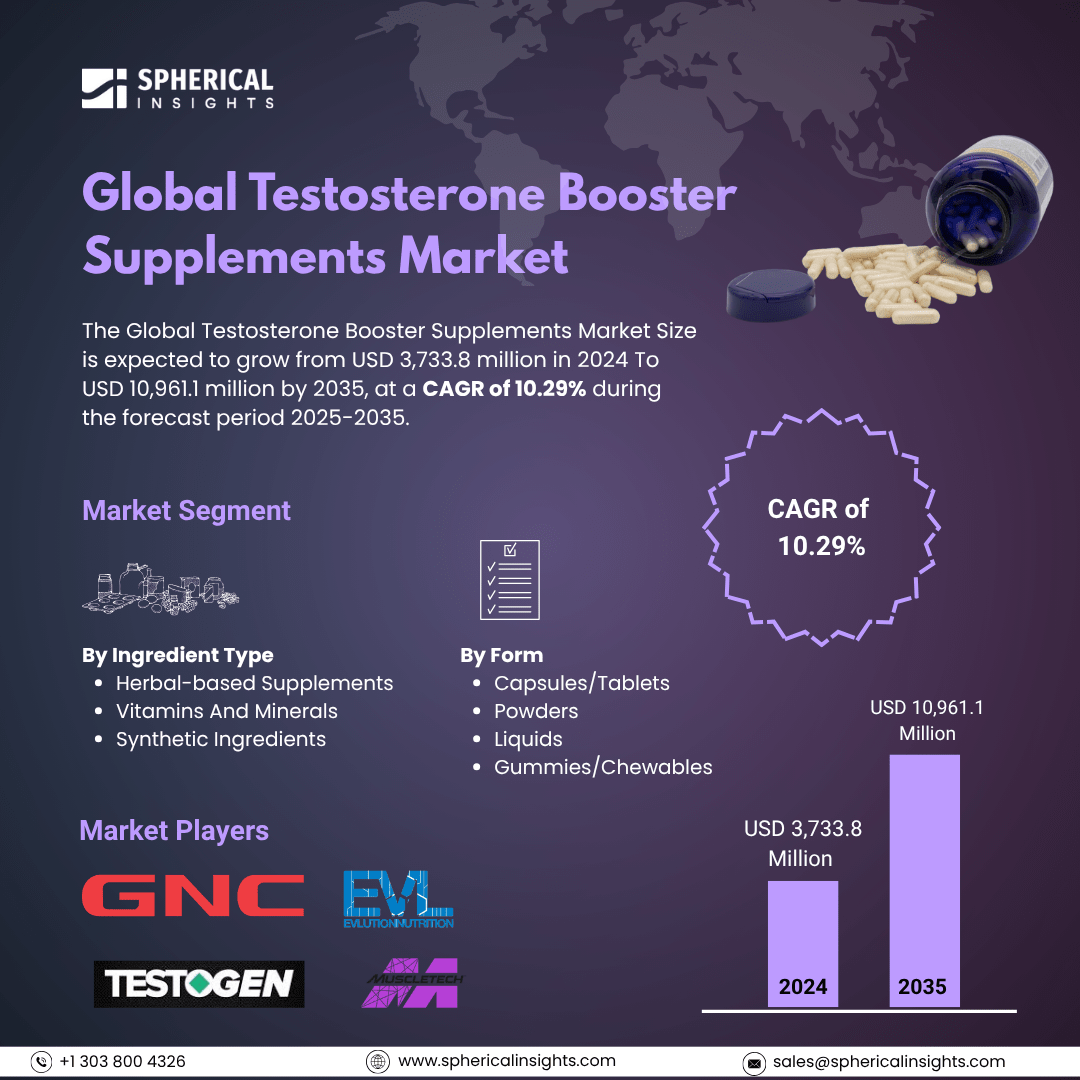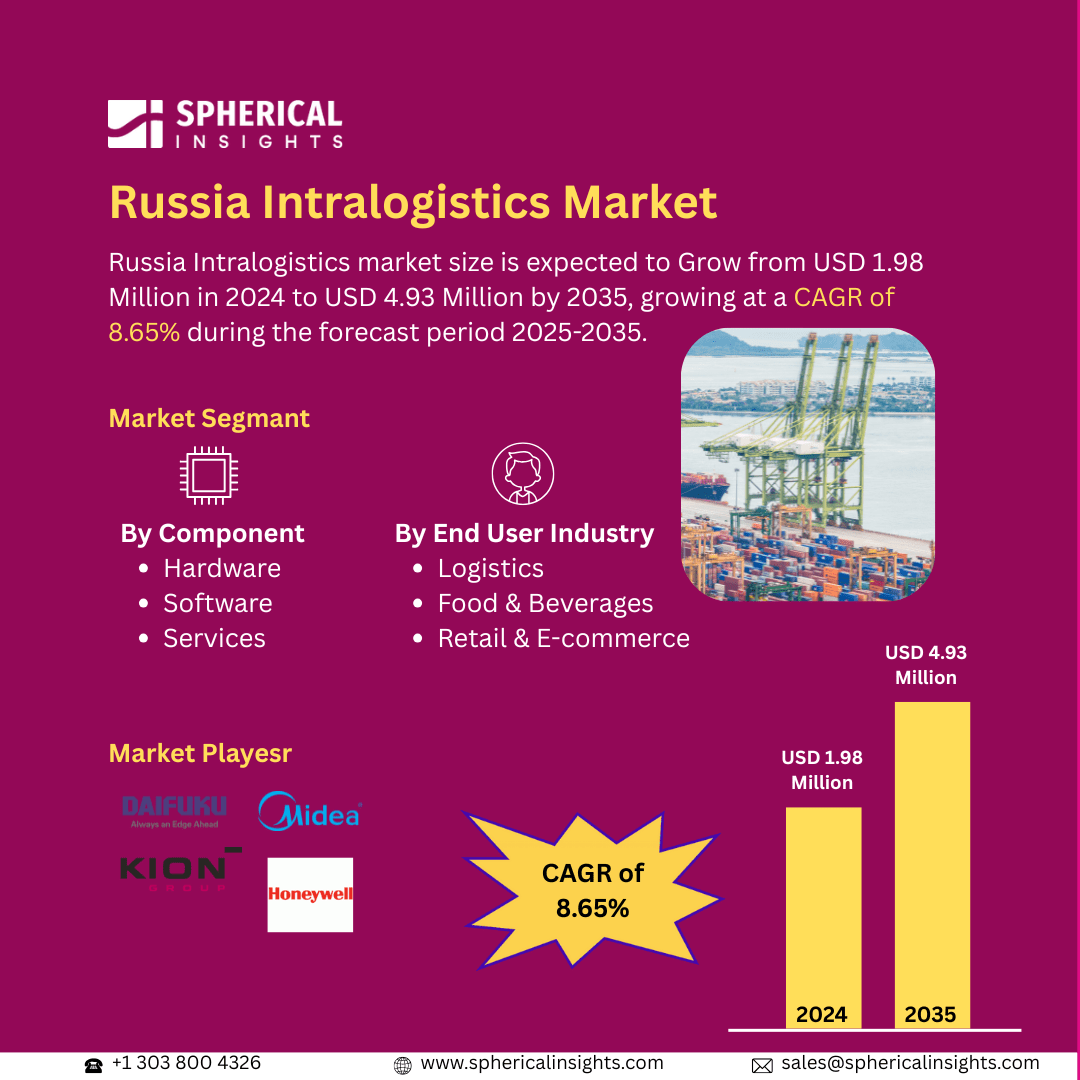Global Testosterone Booster Supplements Market Insights Forecasts to 2035
- The Global Testosterone Booster Supplements Market Size Was Estimated at USD 3,733.8 Million in 2024
- The Market Size is Expected to Grow at a CAGR of around 10.29% from 2025 to 2035
- The Worldwide Testosterone Booster Supplements Market Size is Expected to Reach USD 10,961.1 Million by 2035
- Asia Pacific is expected to Grow the fastest during the forecast period.
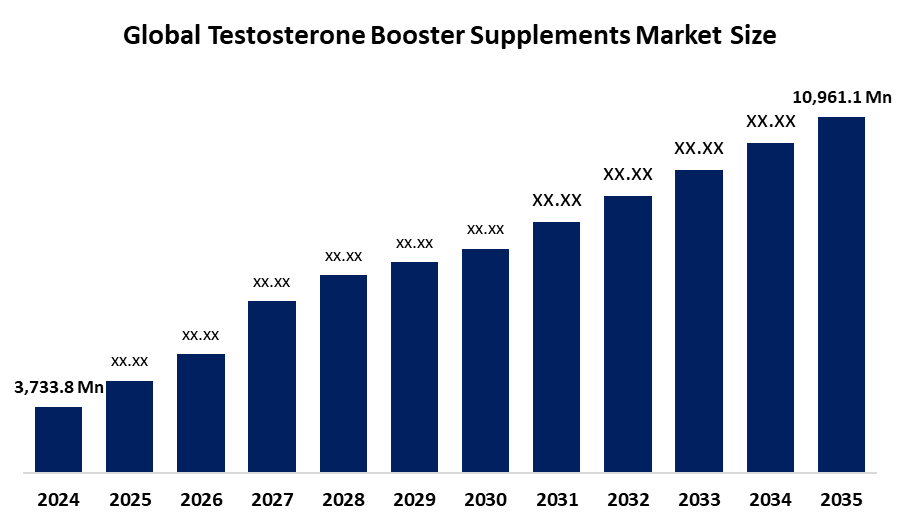
Testosterone Booster Supplements Market
The Global Testosterone Booster supplements market is growing steadily, driven by increasing consumer interest in health, wellness, and hormonal balance. These supplements are available in various forms, including capsules, powders, tablets, and gummies, and are commonly formulated with natural ingredients such as ashwagandha, fenugreek, Tribulus terrestris, and essential nutrients like zinc, magnesium, and vitamin D. They are widely used by individuals looking to support physical performance, muscle development, and overall vitality. The market caters to a diverse range of users, including fitness enthusiasts and aging individuals seeking to maintain energy and hormonal health. Products are sold through various channels, including retail stores and online platforms, offering consumers convenient access. Innovation in product formats and a growing preference for clean-label and plant-based ingredients are influencing product development. With rising awareness about the importance of maintaining healthy testosterone levels, the market is expected to continue expanding with a wide variety of offerings.
Attractive Opportunities in the Testosterone Booster Supplements Market
- Introducing novel product formats like time-release capsules, patches, functional drinks, and gummies/chewables presents an opportunity to attract a broader consumer base. These convenient and user-friendly formats enhance consumer appeal, especially among younger demographics and first-time users.
- Collaborations with gyms, health coaches, and online wellness communities provide channels for education, product trials, and enhanced customer engagement. These partnerships help raise awareness about testosterone health and supplement benefits, driving adoption and repeat purchases.
- Growing consumer preference for clean-label, organic, and plant-based products encourages brands to focus on herbal-based supplements and transparent sourcing. Emphasizing natural ingredients and sustainability can capture health-conscious and environmentally aware consumers.
- The rapid rise of online retail platforms and digital marketing allows companies to reach a wider, tech-savvy audience efficiently. Investing in e-commerce infrastructure and social media campaigns can boost visibility, customer acquisition, and direct-to-consumer sales.
Global Testosterone Booster Supplements Market Dynamics
DRIVER: Growing popularity of fitness
Increasing awareness about men's health and the role of testosterone in physical performance, muscle growth, and overall vitality is a major driver. The growing popularity of fitness, bodybuilding, and athletic training has led to a surge in demand for supplements that support strength and endurance. Additionally, a rise in age-related health concerns, including reduced energy and hormonal imbalances, has prompted middle-aged and older men to seek natural solutions for maintaining testosterone levels. The shift toward preventive healthcare and the growing acceptance of dietary supplements are also contributing to market growth. Innovations in formulation, such as the introduction of gummies and clean-label products, have attracted a wider range of consumers. Furthermore, the increasing availability of these supplements through online platforms has enhanced accessibility and consumer reach. Combined, these factors are fueling the steady expansion of the testosterone booster supplements market.
RESTRAINT: Lack of strong scientific evidence to support the effectiveness of many products
One major issue is the lack of strong scientific evidence to support the effectiveness of many products. This makes some consumers doubtful about whether these supplements really work. Safety concerns are also a problem, as some users may experience side effects like acne, mood swings, or other health risks. In addition, strict regulations in different countries require companies to follow specific rules for labeling and proving their health claims, which can be costly and time-consuming. Misleading marketing and fake or low-quality products further reduce consumer trust in the market. Lastly, high prices of premium or clinically tested supplements may prevent some people from buying them. These factors combined can limit the overall growth of the market, unless companies focus more on safety, transparency, and quality.
OPPORTUNITY: Growing interest in developing testosterone boosters for women
One promising area is creating products for specific groups, such as vegans, athletes, and people with unique health needs. There is also growing interest in developing testosterone boosters for women, which is still a less-explored market. Innovations like time-release capsules, patches, and drinks can make supplements more appealing and easier to use. Companies can also partner with gyms, health coaches, and online wellness platforms to reach more customers and educate them better. Another big opportunity is offering personalized supplements based on an individual’s health or DNA profile. Lastly, expanding into developing countries where people are becoming more health-conscious but have fewer product options can help companies grow. These new paths can help brands stand out and succeed in the competitive supplement market.
CHALLENGES: Lack of knowledge can make them stop using the product
With so many similar products available, it’s hard for new or smaller brands to stand out, and customers often find it difficult to choose the right one. Natural ingredients used in these supplements can vary in quality, which may affect how well the product works. Many people also don’t fully understand how these supplements work and may expect quick results, leading to disappointment if they don’t see changes right away. This lack of knowledge can make them stop using the product or switch brands too quickly. In some cultures, talking about hormonal health is still considered uncomfortable, which can prevent people from buying or asking about these products. To overcome these challenges, companies need to focus on educating consumers, building trust, and offering high-quality, reliable products.
Global Testosterone Booster Supplements Market Ecosystem Analysis
The global testosterone booster supplements market is experiencing strong growth, driven by increasing health awareness, aging populations, and fitness trends. Herbal ingredients like ashwagandha and fenugreek are popular, with North America leading in market share and Asia-Pacific showing rapid expansion. E-commerce, personalized nutrition, and demand for clean-label products are reshaping the industry. Key players include GNC, Testogen, and MuscleTech. Despite growth, the market faces challenges such as regulatory scrutiny, safety concerns, and limited scientific validation. The future points toward holistic, tech-driven wellness solutions focused on overall hormonal balance.
Based on the ingredient type, the herbal-based supplements segment held the largest revenue share and is expected to grow at a substantial CAGR over the forecast period
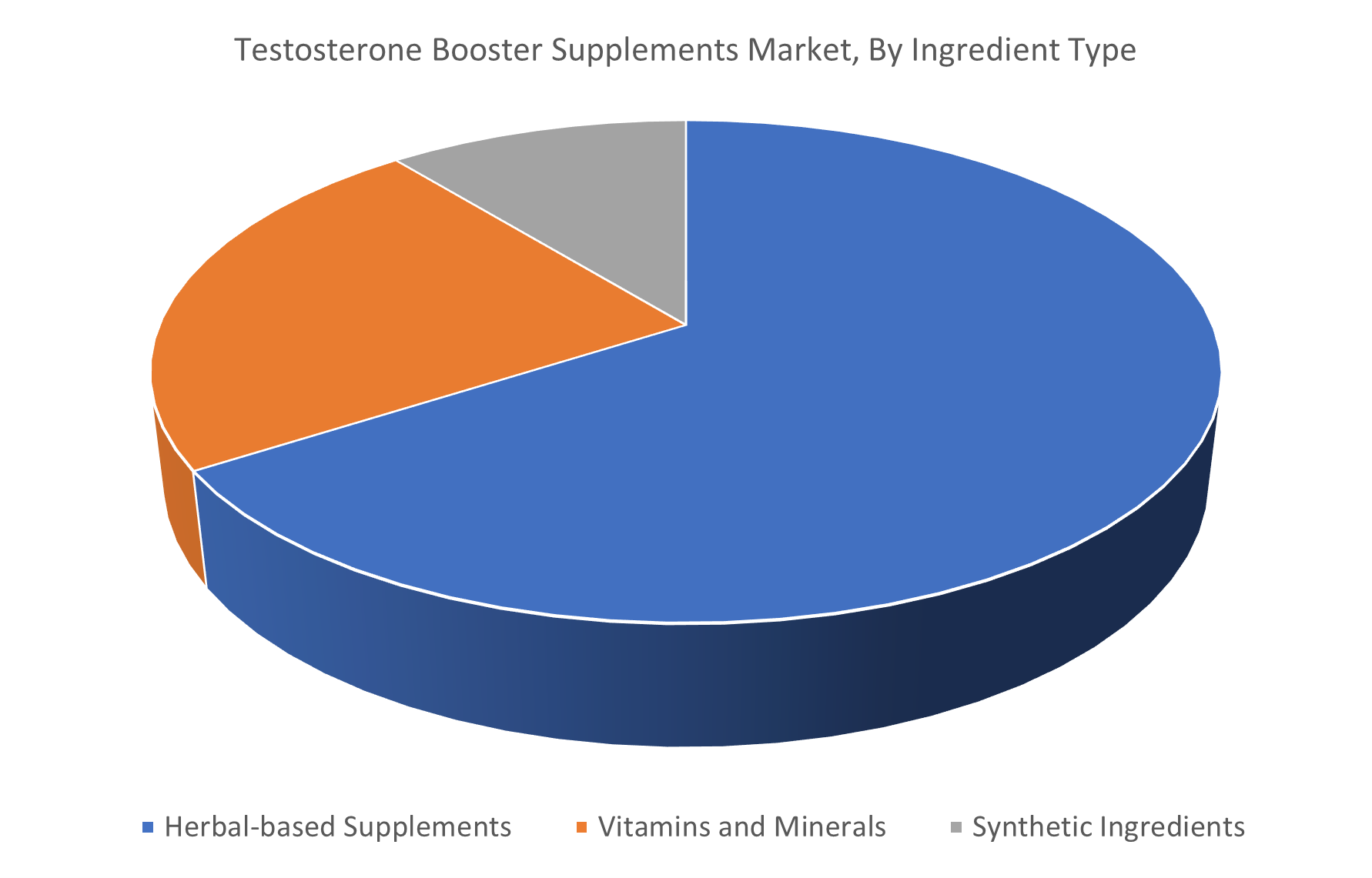
The herbal-based supplements segment growth is primarily driven by increasing consumer preference for natural and plant-based ingredients, which are perceived as safer and more compatible with long-term health compared to synthetic alternatives. Traditional herbs such as ashwagandha, fenugreek, ginseng, and tongkat ali have a long history of use in systems like Ayurveda and Traditional Chinese Medicine, enhancing their credibility and appeal. The clean-label movement and rising demand for organic, transparent formulations further support this trend, as consumers seek products with fewer artificial additives and verified sourcing. Additionally, the popularity of herbal supplements is expanding due to widespread online availability, effective marketing strategies, and growing clinical interest in their efficacy.
Based on the form, the gummies/chewables segment is expected to grow at a significant CAGR over the forecast period
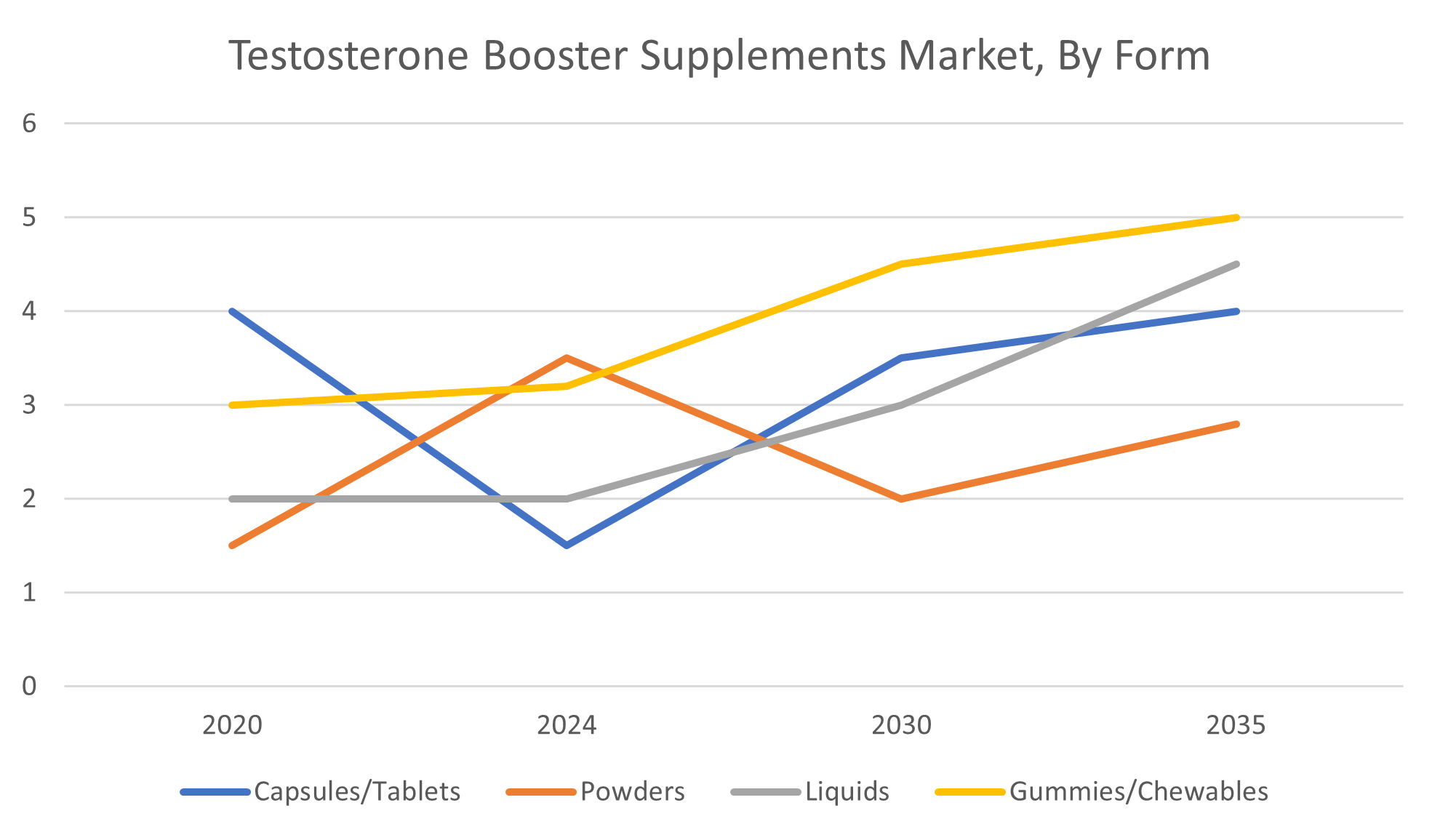
The gummies/chewables segment growth is driven by increasing consumer demand for convenient, easy-to-consume alternatives to traditional capsules and tablets. Gummies and chewables offer improved taste, portability, and ease of use, making them particularly appealing to younger demographics and first-time supplement users. Additionally, the rise in functional food trends and innovations in flavor, texture, and nutrient delivery have made these formats more attractive. As a result, brands are expanding their product lines to include gummy-based testosterone boosters, contributing to the segment’s rapid expansion.
North America is anticipated to hold the largest market share of the testosterone booster supplements market during the forecast period
North America is anticipated to hold the largest market share of the testosterone booster supplements market during the forecast period. This dominance is attributed to several factors, including high consumer awareness of men's health and fitness, a well-established dietary supplements industry, and greater disposable income. The region also has a strong presence of leading supplement brands and a growing trend of self-care and preventive health practices. Additionally, the widespread availability of products through retail and online channels, along with increasing demand for natural and clean-label supplements, further supports market growth in North America.
Asia Pacific is expected to grow at a significant CAGR in the testosterone booster supplements market during the forecast period
Asia Pacific is expected to grow at a significant CAGR in the testosterone booster supplements market during the forecast period. This growth is driven by rising health awareness, increasing disposable incomes, and a growing interest in fitness and wellness across emerging economies such as India, China, and Southeast Asian countries. The region’s strong cultural foundation in traditional medicine, including the use of herbs like ashwagandha and ginseng, supports consumer acceptance of natural testosterone-boosting supplements. Additionally, expanding e-commerce platforms and the growing popularity of personalized nutrition are making these products more accessible, further accelerating market expansion in Asia Pacific.
Recent Development
- In November 2023, Jagat Pharma, a prominent name in India's ayurvedic pharmaceutical sector, introduced a new Testosterone Booster designed to enhance energy, endurance, and muscle strength. This innovative supplement aims to elevate testosterone levels, thereby supporting muscle development and boosting overall energy. It also improves focus, stamina, and physical strength, enabling users to perform better in various aspects of their lives.
Key Market Players
KEY PLAYERS IN THE TESTOSTERONE BOOSTER SUPPLEMENTS MARKET INCLUDE
- GNC
- Testogen
- EVLUTION Nutrition
- MuscleTech
- Prime Male
- Force Factor
- Biotrim Labs
- Hunter Test
- GAT Sport
- Herbalife
- CrazyBulk
- Others
Market Segment
This study forecasts revenue at global, regional, and country levels from 2020 to 2035. Spherical Insights has segmented the testosterone booster supplements market based on the below-mentioned segments:
Global Testosterone Booster Supplements Market, By Ingredient Type
- Herbal-based Supplements
- Vitamins And Minerals
- Synthetic Ingredients
Global Testosterone Booster Supplements Market, By Form
- Capsules/Tablets
- Powders
- Liquids
- Gummies/Chewables
Global Testosterone Booster Supplements Market, By Regional Analysis
- North America
- Europe
- Germany
- UK
- France
- Italy
- Spain
- Russia
- Rest of Europe
- Asia Pacific
- China
- Japan
- India
- South Korea
- Australia
- Rest of Asia Pacific
- South America
- Brazil
- Argentina
- Rest of South America
- Middle East & Africa
- UAE
- Saudi Arabia
- Qatar
- South Africa
- Rest of the Middle East & Africa
